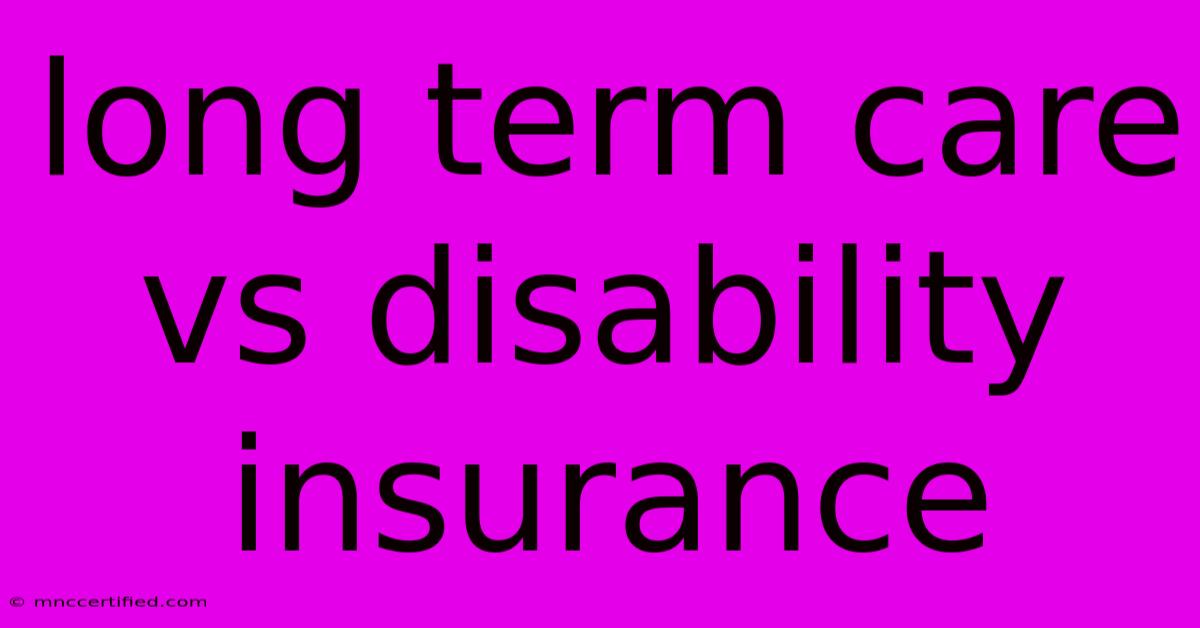Long Term Care Vs Disability Insurance

Table of Contents
Long-Term Care vs. Disability Insurance: Which One Do You Need?
Navigating the world of insurance can be overwhelming, especially when it comes to long-term care and disability insurance. Both offer crucial financial protection, but they cater to different needs and circumstances. Understanding the key differences between these policies can help you make an informed decision for your future well-being.
Long-Term Care Insurance: For When You Need Help with Daily Activities
Long-term care insurance specifically covers expenses associated with chronic illnesses or disabilities that make it challenging to perform everyday tasks. This could include:
- Activities of Daily Living (ADLs): Bathing, dressing, eating, toileting, transferring (moving from bed to chair), and continence.
- Instrumental Activities of Daily Living (IADLs): Managing finances, preparing meals, using transportation, and handling housework.
Long-term care insurance can help pay for:
- Nursing home care: Providing 24/7 medical and personal care.
- Assisted living facilities: Offering supportive services and a more independent living environment.
- Home health care: Receiving professional care in the comfort of your own home.
- Adult day care: Providing structured programs and support for individuals who can't be left alone during the day.
Benefits of Long-Term Care Insurance:
- Financial protection: Covers expensive long-term care costs, preventing you from depleting your savings.
- Care options: Provides flexibility to choose the type of care that best suits your needs.
- Peace of mind: Knowing your long-term care needs will be met financially can ease stress and anxiety.
Drawbacks of Long-Term Care Insurance:
- Cost: Premiums can be significant, especially for older individuals or those with pre-existing conditions.
- Potential for non-coverage: Policies may have limitations on coverage based on the type of care, duration, or pre-existing conditions.
- Not all policies are created equal: Carefully compare features, costs, and benefits of different policies.
Disability Insurance: For When You Can't Work
Disability insurance provides financial support when you become unable to work due to a disabling condition or injury. It replaces a portion of your lost income, allowing you to maintain your financial stability during a challenging period.
Benefits of Disability Insurance:
- Income replacement: Helps cover your living expenses and debt payments while you're unable to work.
- Peace of mind: Knowing you'll have financial security can reduce stress and anxiety during a disability.
- Different types of coverage: Short-term disability provides temporary coverage, while long-term disability offers longer-term support.
Drawbacks of Disability Insurance:
- Cost: Premiums can be high, especially for high-income earners or those with physically demanding jobs.
- Waiting periods: You might have to wait a certain period before benefits kick in.
- Potential for limited coverage: Certain conditions might not be covered, and benefits might be reduced or eliminated after a certain period.
Choosing the Right Insurance for You
Which policy is right for you depends on several factors:
- Your age and health: Younger, healthier individuals may benefit more from disability insurance, while older adults may prioritize long-term care insurance.
- Your financial situation: Consider your income, savings, and debt obligations when evaluating policy costs and benefits.
- Your family history: If you have a family history of chronic illness or disability, long-term care insurance might be a wise investment.
- Your career and lifestyle: Physically demanding jobs may warrant disability insurance, while those with high-risk hobbies might benefit from long-term care coverage.
It's essential to consult with a financial advisor or insurance broker to assess your individual needs and determine the best course of action. They can help you analyze your circumstances, compare different policies, and choose the coverage that best protects your financial future.
By understanding the differences between long-term care and disability insurance, you can make informed decisions about your financial security and peace of mind.

Thank you for visiting our website wich cover about Long Term Care Vs Disability Insurance. We hope the information provided has been useful to you. Feel free to contact us if you have any questions or need further assistance. See you next time and dont miss to bookmark.
Featured Posts
-
Above Ground Pool Pool Bonding Diagram
Nov 09, 2024
-
G League Bronny James Debut Expected Saturday
Nov 09, 2024
-
Cancellation Of Parole In Place Explained
Nov 09, 2024
-
Todd Golden Accused Of Sexual Misconduct
Nov 09, 2024
-
Beyonce Swift New Grammy Milestones
Nov 09, 2024